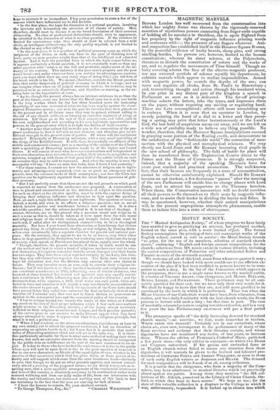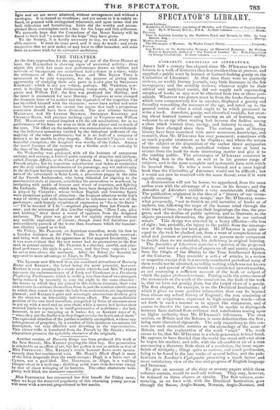MOTET SOCIETY.
THE " Musical Antiquarian Society," of whose progress we have lately been enabled to give so gratifying an account, has produced another, formed on the same plan, with a more limited object. The former Society contemplates the printing of rare and manuscript works of the English school, sacred as well as secular : the Motet Society intends " to print, for the use of its members, selections of standard church music," embracing " English and foreign ancient compositions for the church ; selections from MS. music extant in various libraries, including the sacred compositions of Palestrina and other celebrated Italian and Flemish masters of the sixteenth century." We welcome all aid of this kind, come from whatever quarter it may; though we should have looked with more confidence to the efficient ex- ecution of the plan if it had been confided to persons known to be com- petent to such a duty. In the list of the Committee which appears in the prospectus, there is not a single name known to the musical public. It consists of Viscount ADARE, nine clergymen, and Messrs. BELLASIS, BURNS, LESLIE, and RICHARDSON. These gentlemen may be all emi- nently qualified for their task, but we have only their own words for it. We shall be happy to learn that they are, and still more gratified to be convinced by the mode in which it is performed. Time was when the Minor Canons of our Cathedrals would have been, from education, from station, and from daily familiarity with the best church music, the fittest persons to intrust with such a duty : but that time is past. The race of musically-educated priests is verging towards extinction, and in a very few years the late Parliamentary enactment will put a final period to it.
The prospectus speaks of " the daily increasing demand for standard church music,"—an assertion, we fear, made somewhat at random. Where exists this demand? Certainly not in our cathedrals, whose choirs are, even now, incompetent to the performance of many of the finest services and anthems that their libraries contain, and whose dignitaries have not manifested any desire, of late years, to increase them. Witness the edition of PURCELL'S Cathedral Music, published a few years since—the only edition in existence—to which two Deans and Chapters subscribed. If his genius and unrivalled fame as an English church- writer failed to secure any attention from these dignitaries, it will scarcely be given to the learned and laboured pro- ductions of COSTANZO PORTA and ADRIAN WILLAERT, or even to those of such early English writers as JOHNSON and HEATH. The demand for such compositions will be found, if at all, among collectors. It is possible that the clergymen, who form a majority of the Com- mittee, may have admittance to musical libraries which are practically closed against the public. Among those they mention " the MS. col- lections of Dr. Aldrich, 'preserved in the Library of Christ Church, Ox- ford, to which they hope to have access." We hope so too ; for the state of this valuable collection is a disgrace to the College to which it was, unfortunately, bequeathed. It is locked up in closets into which light and air are never admitted, without arrangement and without a catalogue. It is treated as worthless ; and yet access to it is rudely re- fused, or granted with undisguised reluctance, and upon terms that are both ridiculous and humiliating. Little did the worthy and accom- plished Dean contemplate such a fate for his large and rich collection. We earnestly hope that the Committee of the Motet Society will be found to have had " a reason for the hope" they have given.
To the Society, it is hardly necessary to say, we wish every pos- sible success. It must do some good, and it may du much ; and every suggestion that we now make, or may have to offer hereafter, will arise from an earnest wish for its extensive usefulness.



























 Previous page
Previous page